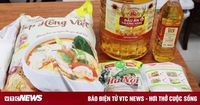Authorities in Phu Tho Province have uncovered a significant food fraud operation involving Famimoto Vietnam Co., Ltd., leading to the seizure of over 71,000 liters of cooking oil, approximately 40 tons of monosodium glutamate (MSG), 22 tons of seasoning seeds, and 9 tons of counterfeit soup powder. The raid, conducted on April 27, 2025, in Thuy Van Commune, Viet Tri City, has raised serious concerns about food safety and public health.
The Phu Tho Provincial Police initiated the investigation after receiving reports of suspicious activities at the company’s facility. Upon inspection, they discovered that Famimoto had released a staggering 144 tons of cooking oil, 118 tons of fake soup powder, and 363 tons of counterfeit seasoning seeds into the market. Additionally, there were indications that over 1,220 tons of MSG were in violation of labeling regulations.
The counterfeit products, which are primarily sold to industrial kitchens, pose a significant health risk to workers who consume them. The police have expressed alarm over the potential consequences of such widespread distribution of substandard food products.
According to the investigating agency, the fake MSG, seasoning seeds, and cooking oil packaged by Famimoto include two main types of MSG: Boat Brand MSG, claimed to be of Singapore origin, and Famimoto MSG, marketed as a leading Vietnamese brand with Japanese technology. For the cooking oil, Famimoto bottled it under two labels: Boat Brand premium cooking oil and Fami Gold vegetable oil, both allegedly made from 100% Singapore-imported materials.
Furthermore, the company produced two types of soup powder: high-grade Hanoi soup powder and Bep Hong Viet seasoning seeds. The production process involved purchasing raw materials from various suppliers, mixing them in specific ratios, and then creating granules through drying processes. These products were then packaged in nylon bags, with specifications of 400 grams for soup powder and 5 kilograms for seasoning seeds.
Famimoto Vietnam Co., Ltd. had self-declared the quality of these products, but the results from the Criminal Science Institute of the Ministry of Public Security indicated that the nutritional value and other quality metrics did not meet the standards published by the company or those stated on the product labels.
The findings have prompted calls for stricter regulations and oversight in the food production industry, especially concerning the safety of products sold in bulk to industrial kitchens. Authorities are now investigating the full extent of the distribution network and whether other companies may be involved in similar fraudulent activities.
This incident highlights a growing concern in Vietnam regarding food safety and the integrity of food products. As the country continues to modernize its food supply chain, the risks associated with counterfeit and substandard food products remain a significant challenge.
Officials are urging consumers to remain vigilant and report any suspicious products or practices they encounter. The Ministry of Public Security has promised to take stringent measures against those involved in food fraud, emphasizing the importance of protecting public health.
As the investigation continues, the Phu Tho Provincial Police are expected to provide further updates on the case, including potential legal actions against Famimoto and any associated parties. The outcome of this case could set a precedent for how food fraud is handled in Vietnam moving forward.
In light of these developments, consumers are encouraged to seek out reputable brands and to be cautious about purchasing food products from unfamiliar sources. The health risks posed by counterfeit food products can be severe, and public awareness is crucial in combating this growing issue.




